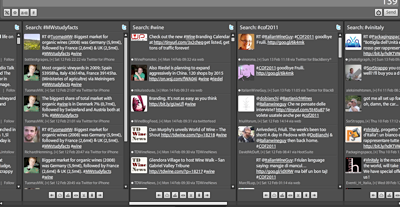Oh yeah, it’s just 7 days away and I’m darn excited to be able to participate. I’ve been sending emails and booking meetings for the past days and dealing with some last minute things but now I feel I’m ready to rock ‘n roll.
As I have said earlier I will be posting updates through Twitter and my blog. Uploading videos, interviews and a lot more. If you are interested to meet with me while in VinItaly don’t hesitate to contact me by email [email protected].
So, what can you do in VinItaly and how to get ready for the big event. There are a lot of things happening between 7-11th of April. Below are few examples to keep yourself busy:
- Taste & Play by TweetYourWines.com is a “virtual path” where you can go through all the wineries of the TweetYourWines -project. You can read the instructions through the link. Get things right and you can wine bottles of wine. So get out there and try “Taste & Play”. I really love the idea!
- Check out Freewine where you can taste wines which has a very low sulfite content - Should be very interesting! You can register through here.
- Be sure to visit Pad 7B to experience wines from Umbria - you can contact @vinoumbria through Twitter to set up a meeting. I’m sure I will be learning something new!
- Go through the Exhibitors Catalogue 2011 and find your favorite wineries or experience new ones which you have never heard before. My mantra is “always to expand your palate!”. You can easily print them out and take them with you to VinItaly.
- It’s not all about wine, there are plenty of other areas to visit as well. For example SOL Verona is representing huge varieties of olive oils from Italy. I’m a huge olive oil nerd so I’m definately visiting SOL! There is also the Agrifood Club which will be showing the top produce from coffee to cured meats. Check it out!
I’m quite sure I missed humongous amount of different events happening in VinItaly but if I come across with something special to taste or try I’ll be tweeting or bloggin’ it!
See you there!

Wine Blogging Wednesday was great fun and I really loved the wines I found. Both Bellingham Grenache Blanc with Viognier and Spinifex Papillon were great finds and I will certainly continue consuming them.
Winecast.net posted the wrap-up for #WBW71 and according to them 25 bloggers participated and 28 wines were tasted. Nice! I’m sure we can get the numbers up. Huge thanks to Tim Elliot from Winecast for hosting the event! These events really bring bloggers together and make us expand our palates and try new wines.
The next #WBW72 theme will be a very special one “Helping Japan” (via The Passionate Foodie) - read more about it from the Wine Blogging Wednesday blog here - and you can count me in for the next one and I want to see YOU participating for it as well, it’s for a good cause!
It’s time for Wine Blogging Wednesday again! This time the theme was Rhône but not from Rhône and boy I got some goodies for you guys and gals!
First off we will start with Bellingham The Bernard Series “Looong name” Whole Bunch Grenache Blanc Viognier from Paarl which was a huge suprise for me and got me in love with this blend and wine!
Second wine I’ll be reviewing for the #WBW71 is Spinifex Papillon 2006 which is a blend of Carignan, Cinsault and Granache from Barossa Valley. This was the bomb, great acidity, fresh and lovely. It keeps opening up in glass revealing more and more. One thing that pulls me off is the price, they could sell 10 times more if they would drop the price to 20 euros.
Thank you folks at winecast.net for hosting the #WBW71 and hope to see the #WBW72 as soon as possible because this is major FUN!
Over and out.

VinItaly 2011 is jut one month away and I’m super excited to be able to visit this huge event in the heart of Verona, Italy. There will be over 4000 exhibitors and around 153 000 visitors from all around the world with well.. few wines.
I will be posting videos of the event and updating my Twitter (@aleksimehtonen) as often as I can with the tags #vinitaly or #vinitaly2011 so follow those hashtags! And If you are coming please do not hesitate to contact me! I’m always interested to meet up.
See you there!

Most of us might not have recovered from the Spain filled #WBW70 hangover yet and we already have the next #WBW71 announced. It will be hosted by folks at Winecast with a very interesting theme; “Rhones not from Rhône”. Get creative bloggers as it will be held on March 16th.
The Details (via Winecast):
- Choose one or more wines made from Rhone varieties but not made in Frances’ Rhône region and post to your blog, Posterous or Twitter stream by Wednesday, March 16th.
- If you announce your entry on Twitter or Facebook, please be sure to add the hashtag #wbw71 to your status update.
- Send me an email at winecast (at) gmail (dot) com and let me know where I can find your post so I can produce a summary after the event.
- Don’t have a blog, Posterous or Twitter account? Just send me your entry via email and I will post it up on the WBW Posterous.

Hashtags are used often to mark keywords or topics in the Twitter world. Wine world has a lot of them - here is a few that I follow closely.
#vintage2011
If you are interested on following the recent updates about Vintage of 2011 then you should add #vintage2011 to your Twitter searchers.
#vinitaly and #vinitaly2011
Are you coming to Vinitaly 2011? It’s held in Verona from 7th to 11th of April and it’s probably the biggest wine exhibitions in the world. At the moment these hashtags really don’t have much to offer - but do let yourself loose there and tweet some #vintaly hype!
#wine
Through here you can simply follow wine trends and see what people are enjoying. Rather active on Fridays! If you haven’t added this to your searchers - do it now!
#cof2011
Colli Orientali del Friuli 2011 is a group of 6 American wine blogger who are currently going through the beautiful hills of Friuli - tasting wines and reporting everything! Be sure to checkout their blog as well at http://www.cof2011.com
#EWBC and #BDWA
European Wine Bloggers Conference and Born Digital Wine Awards - These hashtags are a must-follow for everyone writing a blog or doing anything wine related over the internet. Next EWBC is being held in Franciacorta, Italy and what I heard from the 2010 event I’ve already ordered my tickets to the EBWC 2011.
#MWStudyFacts
Follow the latest tweets from Masters of Wine, MW students and other enthusiasts adding interesting sites, facts around the wine world.
Here’s my shortlist - if you have suggestions on what tags we all should be following you can use the comment section below and I’ll add it to the list.












